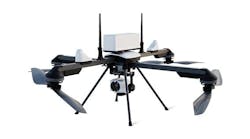PHOENIX, March 28, 2017 – The Federal Aviation Administration (FAA) and partners Northrop Grumman and ACSS, an L3 and Thales Company, today announced a series of successful flight tests of the sense-and-avoid avionics systemfor Unmanned Aerial Systems (UASs).The flight tests led by Northrop Grumman were conducted at the Mojave Air and Space Port in Mojave, California. Participating were FAA staff from federally funded research and development centers, including the Massachusetts Institute of Technology Lincoln Laboratory and Johns Hopkins University Applied Physics Laboratory (APL), which developed the algorithms and software for ACAS Xu.The FAA TCAS Program Office is developing the advanced Airborne Collision Avoidance System (ACAS) as a successor to the Traffic Alert and Collision Avoidance Warning System (TCAS) to support the objectives of its Next-Generation Air Transportation System Program (NextGen). All ACAS X variants detect conflicts with intruder aircraft, issue Resolution Advisories and coordinate maneuvers with other collision avoidance systems. ACAS Xa and Xo are intended for current TCAS users, and ACAS Xu is designed for UAS and other vehicles with new surveillance technologies and different performance characteristics.“The flight tests collected data necessary to validate simulation models and help inform the continued development of ACAS Xu,” said Greg Boerwinkle, ACSS UAS Program Manager. “This is a critical capability to advance the economic viability and safety aspects of large UAS operations. The capabilities under development for large UASs to detect and avoid collisions will be substantially better than the ability of a pilot to see with the human eye and avoid collisions.”Lincoln Laboratory and APL provided the ACAS Xu software to ACSS and supported the flight tests with overall system expertise. ACSS integrated and tested the ACAS Xu software and provided the hardware to host ACAS Xu leveraging its commercialT³CAS®product, which includes TCAS, transponder and Terrain Awareness Warning System (TAWS) functions. The T³CAS, with ACAS Xu Version 2 software, was integrated on the Northrop Grumman Firebird Demonstrator, an optionally piloted aircraft. Both ACSS and Northrop Grumman also provided manned aircraft that flew predetermined collision encounter geometries with the Firebird Demonstrator.As part of the ACAS Xu development, the FAA is also working with the European Organization for Civil Aviation Equipment (EUROCAE) on international safety standards.Aviation Communication & Surveillance Systems (ACSS), 70 percent owned by L3 and 30 percent owned by Thales, is a joint venture managed by L3’s Aviation Products sector. ACSS provides design and manufacture of products for all aircraft and helicopter segments, and supports products for air transport and regional airlines, business aviation, and helicopter, general aviation and military aircraft operators. ACSS produces avionics systems that increase safety, situational awareness and efficiency for commercial and military flight operators. More than 75,000 ACSS products are operating in commercial, corporate and military aircraft. Thales Avionics is the exclusive air transport sales and support agent of ACSS products. For information about ACSS, visit www.acss.com. For information about Thales Avionics, visit www.thalesgroup.com.About ThalesThales is a global technology leader for the Aerospace, Transport, Defence and Security markets. With 62,000 employees in 56 countries, Thales reported sales of €14 billion in 2015. With over 22,000 engineers and researchers, Thales has a unique capability to design and deploy equipment, systems and services to meet the most complex security requirements. Its exceptional international footprint allows it to work closely with its customers all over the world.About L3 TechnologiesHeadquartered in New York City, L3 Technologies employs approximately 38,000 people worldwide and is a leading provider of a broad range of communication, electronic and sensor systems used on military, homeland security and commercial platforms. L3 is also a prime contractor in aerospace systems, security and detection systems, and pilot training. The company reported 2016 sales of $10.5 billion. To learn more about L3, please visit the company’s website at www.L3T.com.

